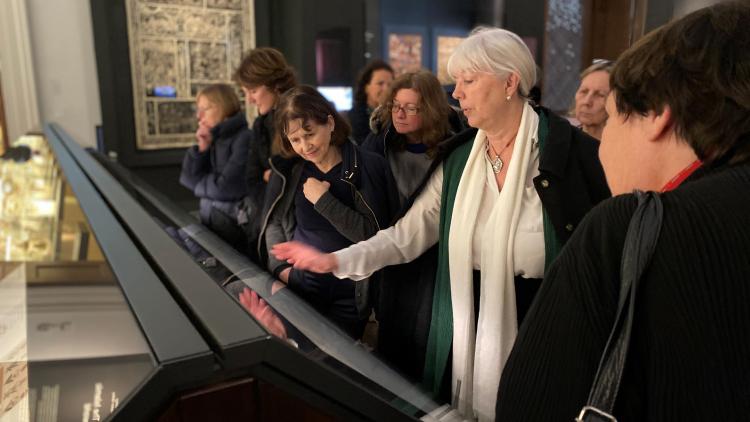BA Chinese and ...



Key information
- Duration
- 4 years
- Start of programme
- September 2026
- Attendance mode
- Full-time
- Location
- Campus
- Fees
-
Home: £9,535
International: £23,780 - Entry requirements
-
AAB-ABB
For joint degrees, the offer is based on the subject with the higher entry requirements
Contextual: ABB-BBB
-
See undergraduate entry requirements and English language requirements for international and alternative entry requirements.
Course overview
The BA Chinese combined honours degree gives a broad understanding of Chinese culture through the study of its language, history and literature from earliest times up to the present, in combination with a solid grounding in another language or discipline.
Why study BA Chinese and...at SOAS?
- We are ranked 13th in the UK for Modern Languages (QS World University Rankings 2025)
- We are ranked 7th in the UK for Asian Studies (Complete University Guide Subject League Tables 2026)
- We are ranked 4th in the UK for 'graduate prospects' (Complete University Guide Subject League Table 2026)
- SOAS is home to the largest concentration of Chinese specialists outside of China
- Spend your third year in China or Taiwan furthering language and cultural proficiency
- Our students consistently take home top prizes at the prestigious Chinese Bridge competition

Use our combined courses tool to see a breakdown of course structure
Key information set data
Teaching and learning
Modern language teaching involves classroom work and independent study. A few non-language modules are taught by formal lecture. The single and combined degree modules are examined through oral and written examinations and coursework or reports.
Contact hours
All full-time undergraduate programmes consist of 120 credits per year, in modules of 60, 30 or 15 credits. They are taught over 10 or 20 weeks. The programme structure shows which modules are taught over one term or the full year. It also shows which modules are compulsory and which are optional.
As a rough guide, 1 credit equals approximately 10 hours of work. Most of this will be independent study. It will also include class time, which may include lectures, seminars and other classes. Some subjects, such as learning a language, have more class time than others.
More information is on the page for each module.
Year abroad
Students spend the third year of their BA Chinese degree at Beijing Normal University (BNU) or in Taiwan. Single-subject degree students are required to take the following modules:
- Newspaper Reading (baokan 报刊)
- Reading and Writing (duxie 读写)
- Conversation (huihua 会话)
- Listening (tingli 听力)
In order to proceed to the final year, students must pass all four of the language modules taken at BNU. If a student fails one language module, they will be offered a re-entry test in September of the same academic year, to determine whether or not they can continue to Year 4.
SOAS Library
SOAS Library is one of the world's most important academic libraries for the study of Africa, Asia and the Middle East, attracting scholars from all over the world. The Library houses over 1.2 million volumes, together with significant archival holdings, special collections and a growing network of electronic resources.
Pre-entry readings
- Ebrey, Patricia: The Cambridge Illustrated History of Chinese Civilization. Cambridge: Cambridge UP, 1996/2010.
- Mair, Victor H.: The Columbia History of Chinese Literature. New York: Columbia University Press, 2001.
- Shei, Chris: Understanding the Chinese Language. London and New York: Routledge, 2014.
Fees and funding
Fees for 2025/26 entrants per academic year
| Programme | Full-time | |
|---|---|---|
| Home students | Overseas students | |
| BA, BSc, LLB | £9,535 | £23,780 |
| BA/BSc Language year abroad | £1,425 | £11,770 |
See undergraduate fees for further details.
Employment
Graduates from the Department of East Asian Languages and Cultures develop competencies in intercultural awareness, analysis and communication. Demand for specialists with advanced proficiency in the languages of China, Japan and Korea has significantly increased in recent years, and graduates with these skills are highly sought after by employers.
Recent graduates have been hired by organisations including:
- Accenture
- Amazon
- Bloomberg LP
- Department for Work and Pensions
- European Alliance for Human Rights in North Korea
- European Commission
- ITN
- Japanese Government
- Korea Trade Centre (KOTRA)
- KPMG
- Mizuho Bank
- Nagahama Board of Education
- Nanjing Museum
- Pinsent Masons LLP
- PwC
- Seoul Metropolitan Government
- Shelterbox
- UNDP
Find out about our Careers Service












